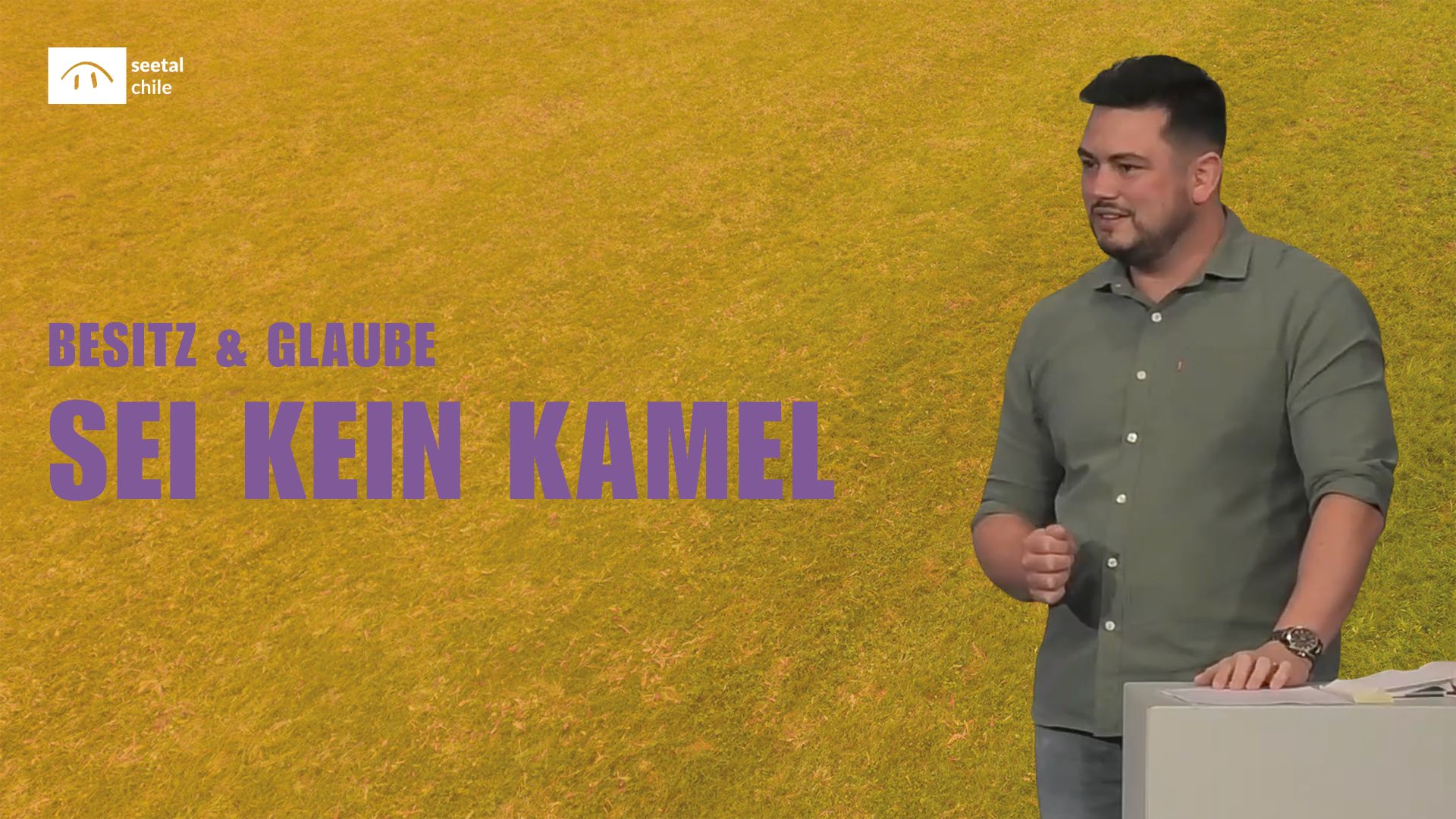Gideon – God does not need heroes
Series: Like you and me | Bible text: Judges 6:1–24
The people of Israel experienced a very difficult time a few years after their entry into the Promised Land. Over a period of seven years they were plundered and pillaged by the Midianites. To lead the people out of their misery, God calls the fearful Gideon out of hiding and addresses him as a «hero» of all things. When God wants to intervene in a situation, he often calls ordinary people who feel weak. A coward paired with God’s strength makes a hero.
Sometimes you hear the saying: If God is all-powerful, why doesn’t he intervene? Why doesn’t he prevent thousands of children from starving to death every day in Africa? Why doesn’t he help all the desperate and hopeless, all those who are afraid or sick? Why doesn’t he get my addicted colleague or the depressed neighbour out of the hole? God wants to help. God wants to intervene so that his kingdom may spread in this world: that peace, joy, justice, reconciliation, healing, grace and love may spread. But how does this happen?
Israel had finally come to the Promised Land after the 40-year desert period. They experienced how God repeatedly performed miracles in the conquest of the land. Let us think of the mighty city walls of Jericho, which collapsed simply because the people marched around the city with trumpets and loud shouting. Israel also had to fight. But they experienced: God gives victory. Joshua, their leader, was finally able to hand over a portion of the land to each of the tribes. In doing so, all the Israelites reaffirmed their covenant with God: «We will serve the LORD! «The people replied: «We will never leave the Lord to serve other gods».» (Joshua 24:16 NL).
After the death of Joshua, the people quickly forgot all that they owed to God. After the hard time in the desert, there was finally some prosperity. We know that too! We are doing well. The career ladder is going up. Prosperity is becoming greater. And God – fades more and more into the background. Only when there is a fire in our lives and all our self-made attempts to extinguish it fail, do we call again for the heavenly fireman: God, where are you? In the book of Judges we learn how God responds to this cry for help.
From idolatry to chaos
Israel had been burning for some time. For seven years the Midianites had been robbing and plundering everything that was not nailed down and burning the crops. In addition, they suffered one defeat after another. Fearing the next attacks, they hid in the mountains.
Why had it come to this? The answer is: «Again the Israelites did evil in the eyes of the Lord […].»(Judges 6:1 NL). The LORD God was no longer in the centre of their lives. They had begun to offer sacrifices to other gods and build altars to them. At home, there are probably no Buddhas or altars on which we make sacrifices. The modern gods look different. There is the sentence: For that for which you live, that is your God. Who or what shapes our lives? Who determines what we do, what we buy and what is important to us? Don’t the images and words of our idols (literally: idol) often determine what we think and do? What the rich, beautiful and powerful do, say and wear is copied a million times over. When idols shamelessly enrich themselves, it is not surprising that more and more people are only after it: How can I get even more? Have we as Christians not adapted to the lifestyle of our environment in many areas? Often just as selfishly according to the principle: «I do what I enjoy!» or just as mercilessly with others immediately.
The idols in Israel did not deliver what they promised. «In their distress they cried out to the Lord for help»(V.7 GN). How does God respond? He, the LORD, has always loved his people and is only waiting for them to repent. No one has to be ashamed to come to God, even if they have been in the hole for years. God is not above being a fireman for us.
From coward to hero
God does not respond by miraculously driving all the Midianites out of the land. No, God first changes the situation in the land. He wants to be God and Lord alone again in the hearts of the Israelites. We often think that the others are the problem: the spouse, the government, the teacher, the boss. God’s strategy consists of two steps:
- He sends a prophet, reminding Israel of all that God has done for them, and how He commanded them not to worship the foreign idols. «[…] But you did not listen to me!»(V.10 NL).
- He looks for a hero. When God changes a whole people or a congregation, he looks for individuals to lead the way. It is noticeable that God has a preference for calling very unimpressive people. This time it is Gideon. Gideon is in the hole: afraid of the Midianites, he hides in the winepress to thresh wheat. That may be clever, but it’s not particularly brave. «The angel of the Lord appeared to him and said: «The Lord is with you, brave hero!» «(V.12 NL). Is someone taking him for a ride? Gideon asks: Where was God when the Midianites came? I’m supposed to be a coward against this superior force? But the angel does not let himself be shaken off: «Go with the strength you have and save Israel from the Midianites. I am sending you out!» «But my lord,» Gideon replied, «with what can I save Israel? My clan is the weakest in the whole tribe of Manasseh and I am the youngest in my family!» «(v.14f NL). Gideon looks at himself, at what he cannot do and is not. He lets himself be guided by his feelings of inferiority. Instead of being solution-oriented, he behaves in a problem-oriented way..
God knows who you are. He also knows this Gideon. The question is not: What do you you to? The question is: What can God do? What does He through you and me! God is not looking for heroes. He is not looking for the strong. Paul also describes this: «Remember, dear brethren, that few of you were wise or powerful or respected in the eyes of the world when God called you»(1 Corinthians 1:26 NL). But where someone lets himself be needed by God, these weak ones suddenly become heroes. Instead of being paralysed by their own inferiority, such people reckon with the power of God. As was later the case with Gideon. The angel’s address to Gideon, «You strong hero», was not a trick he learned in angel school, along the lines of: a little praise does a person good. No, if God says, «You strong hero», then that is true. The question is: Do you believe the word of God? Do you believe like Paul: «For all things are possible for me through Christ, who gives me the strength I need»(Philippians 4:13 NL). God is not looking for heroes. He is looking for people who trust Him and do what He says. That is how He forms His true heroes.
From the deed of love to the sign
Gideon is like you and me – a completely normal person. Not an adventurer who sets off for battle immediately after the angel experience. Not a gullible guy who goes and loudly proclaims to everyone, «God told me!» How can you just run off full of faith when you haven’t seen anything of God’s work for seven years? So Gideon asks: «If I have found favour in your sight, give me a sign that proves that it is you, Lord, who is speaking to me»(V.17 NL).Gideon was not one of the strong and courageous types, but he had one valuable quality: he was honest with himself. He stood by his doubts and fears. It is not forbidden to ask God for a sign. It is only important that we then accept God’s answer.
By the way, the strongest sign that God is with us and is for us, he gave 2000 years ago. When God gave his Son Jesus. There on the cross hangs God’s clearest sign of love. He died so that we can come out of the hole and run to the Father in heaven.
Gideon has a longing that the signs and wonders would happen again. In all his weakness, he has the desire for God to start working again. How is it with us? Do we just resign ourselves to the fact that so little is happening spiritually in our country? Yes, why don’t we experience more of the mighty acts of God? Why don’t more people find themselves in a relationship with Jesus Christ? God is not just a fireman when we have a fire. Jesus is about us finding the meaning and purpose for our lives. That we live the life he created you and me to live. With Gideon I ask: Lord, show us again today more of who you are!
After the request for a divine sign, Gideon does not simply remain seated, but does what is due. By fetching food and serving it, he thanks the angel for coming. Gideon gives the angel what he has. And then it happens! Instead of eating, the angel takes a staff and sets fire to the bread and meat, so that everything burns. The everyday acts of love we do for others can work miracles.
Gideon is frightened and afraid that he will die. The closer God comes to us, the more we are frightened. There is not always a hallelujah mood, but often tears over our own failures. But then the Lord replies: «Peace be with you. Do not be afraid. You will not die»(V.23 NL). And Gideon builds an altar to his God on the spot. This is the sign of Gideon: You are my God! My life shall be yours! You may use me! God does not need heroes. But he is looking for people who believe his promise: You, you are a strong hero! You can make a difference in this world. Come out of your hole! Don’t be afraid, I am with you! If we take the first steps and offer God what we have – with all our weaknesses – then faith will grow. It is time for us as Christians to come out of our holes. After all, Jesus says: «All authority in heaven and on earth has been given to me»(Matthew 28:18 NL). It is through fearful people like Gideon, through you and me, that God intervenes in this world to this day. God understands this and loves to form heroes out of courageous weaklings.
Possible questions for the small groups
Read the Bible text: Judges 6:1–24
- Why did Israel get into this predicament? Does the principle still apply today that chaos grows out of idolatry?
- How do you think it felt for Gideon to be called to rescue Israel from the Midianites?
- Why does the angel address Gideon as «hero»?
- What was it about Gideon that ultimately made him not chicken out but go for the job?
- What was Gideon’s first act after the calling? What could be the first step for us to make the world a little bit better?





